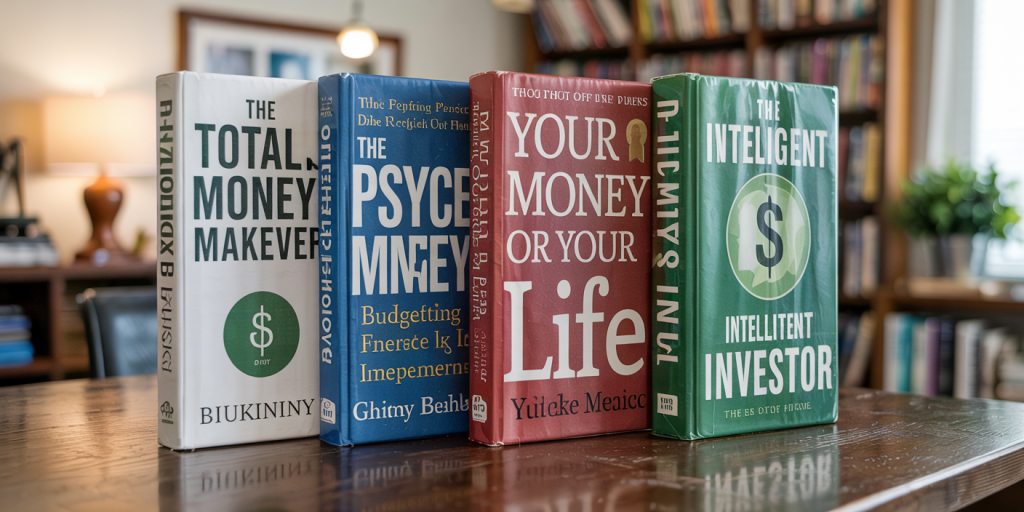Managing personal finances effectively is a key aspect of achieving long-term financial stability and wealth. In today’s rapidly changing economic landscape, gaining sound financial knowledge is more critical than ever. Luckily, countless personal finance books can provide valuable insights into budgeting, investing, saving, and debt management. This guide highlights some of the best personal finance books that everyone should read, offering practical tools and real-world examples to improve your financial literacy.

Why Understanding Personal Finance Matters Today
Financial literacy is a fundamental skill that impacts all areas of life. According to a 2023 survey by the National Financial Educators Council, Americans lose approximately $477 billion annually due to poor financial decisions. With increasing consumer debt and economic uncertainty, having a strong grasp of personal finance concepts can prevent costly errors and pave the way for wealth building.
Modern personal finance education goes beyond simple budgeting. It encompasses knowledge about compound interest, tax optimization, investing strategies, and behavioral finance. For example, understanding how compound interest works can significantly influence decisions about retirement savings. Albert Einstein reportedly called compound interest “the eighth wonder of the world,” highlighting its transformational potential.
Timeless Wisdom in “The Total Money Makeover” by Dave Ramsey
Dave Ramsey’s “The Total Money Makeover” remains one of the most influential personal finance books worldwide. It offers a straightforward, step-by-step approach to debt elimination and wealth creation. Ramsey promotes a zero-based budgeting method combined with a “debt snowball” technique, where you pay off the smallest debt first to build momentum.
For instance, one of the book’s real-life success stories illustrates a family who eradicated $100,000 in debt within three years by following Ramsey’s principles. Their disciplined approach to discretionary spending and aggressive debt repayment not only relieved financial stress but also improved their credit scores dramatically.
Ramsey’s focus on financial discipline aligns with statistics from the Federal Reserve, which found that nearly 40% of Americans would struggle to cover a $400 emergency with cash. This book equips readers with practical tools to avoid such scenarios. Compared to other personal finance books that delve heavily into investment strategies, Ramsey’s work shines by emphasizing financial fundamentals and behavioral change.
Mastering the Psychology of Money with Morgan Housel’s “The Psychology of Money”
Morgan Housel’s “The Psychology of Money” offers a distinct perspective by exploring how emotions and behavior influence financial decisions. Unlike traditional finance books centered on numbers and formulas, Housel reveals how patience, risk tolerance, and storytelling mold our financial lives.
Illustrated through compelling anecdotes, Housel explains why two people with identical incomes may accumulate vastly different wealth. For example, he highlights Ronald Read, a janitor and gas station attendant who amassed a multi-million-dollar fortune simply by saving consistently and investing for decades. This underscores that financial success often results more from behavior than raw intelligence.
Housel also discusses common cognitive biases like overconfidence and loss aversion, which can hinder investing performance. His data-backed insights encourage readers to build patience and restraint, key traits for long-term investing. When compared to more technical books like “The Intelligent Investor” by Benjamin Graham, Housel’s work offers an accessible yet profound understanding of money psychology that resonates with a broad audience.
| Book Title | Core Focus | Best For | Unique Value Proposition |
|---|---|---|---|
| The Total Money Makeover | Debt elimination and budgeting | Beginners and debt-ridden individuals | Step-by-step debt snowball method to gain momentum |
| The Psychology of Money | Behavioral finance | Anyone seeking mindset shift | Explains emotional factors influencing money |
| The Intelligent Investor | Value investing | Intermediate investors | Deep technical dive into disciplined investing |
Comprehensive Financial Independence in “Your Money or Your Life” by Vicki Robin

“Your Money or Your Life” by Vicki Robin provides a holistic view of personal finance that integrates financial independence with life satisfaction. This book challenges readers to rethink their relationship with money and consumption by linking financial health to personal values.
Robin promotes a nine-step program where readers track every expense meticulously and calculate their true hourly rate against life energy invested—that is, the time spent earning money. For example, if a person makes $20 per hour but spends $15 per hour on commuting costs and impulse purchases during breaks, their effective earnings diminish substantially. This practice encourages mindful spending and aligns expenses with genuine priorities.
The book’s effectiveness is backed by dozens of testimonials in which readers successfully reduced expenses, saved more aggressively, and transitioned toward part-time work or early retirement. This mindset shift fits well with the growing FIRE (Financial Independence, Retire Early) movement, which embraces intentional money management.
“Your Money or Your Life” is best suited for readers who want not only to optimize their savings but also to cultivate a balanced and fulfilling financial life. Compared to Ramsey’s debt elimination focus or Graham’s investment approach, Robin’s framework engages readers with life purpose alongside financial goals.
Deep Investing Wisdom with “The Intelligent Investor” by Benjamin Graham
When it comes to investing, Benjamin Graham’s “The Intelligent Investor” is often hailed as the definitive guide. First published in 1949, this classic book laid the foundation for value investing—an investment strategy that prioritizes purchasing undervalued stocks with strong fundamentals.
Graham’s principle of “margin of safety” protects investors from significant losses by encouraging them to buy stocks below their intrinsic value. For example, Warren Buffett, one of Graham’s students and a renowned investor, attributes much of his approach to the lessons learned from this book.
The book covers specific tools like analyzing financial statements, understanding market fluctuations, and adopting a long-term perspective. While challenging for beginners due to its technical nature, it remains invaluable for serious investors aiming to navigate stock markets prudently.
In a comparative sense, “The Intelligent Investor” offers more in-depth and quantitative analysis than behavioral finance books like Housel’s or practical budgeting guides like Dave Ramsey’s. Its emphasis on disciplined investing is corroborated by data showing that value investing has historically outperformed market averages over extended periods.
Comparing Key Personal Finance Books: A Practical Overview
To provide clarity on which personal finance book might best suit different needs, the following table summarizes key attributes and use cases:
| Aspect | The Total Money Makeover | The Psychology of Money | Your Money or Your Life | The Intelligent Investor |
|---|---|---|---|---|
| Target Audience | Debt-ridden beginners | General readers | Mindful spenders and FIRE enthusiasts | Serious investors |
| Core Lesson | Debt snowball budgeting | Emotional money behavior | Financial independence and life energy | Value investing principles |
| Complexity Level | Beginner-friendly | Accessible | Intermediate | Advanced |
| Practical Examples | Debt repayment stories | Life anecdotes and case studies | Real-life spending and saving transformations | Investment analysis tools |
| Time to Implement Concepts | Short to medium term | Ongoing mindset shift | Long-term lifestyle change | Long-term investing approach |
Future Perspectives: Financial Literacy in an Evolving Economy
As technology advances and economic dynamics shift, personal finance knowledge must adapt accordingly. The rise of cryptocurrencies, fintech apps, and robo-advisors introduces both opportunities and challenges for investors and savers. While traditional finance books lay a solid foundation, ongoing education is necessary to navigate digital assets and new financial products.

Moreover, given the increasing importance of sustainable investing and social impact, future personal finance books may focus more on ethical wealth building and responsible consumption. Integrating environmental, social, and governance (ESG) factors into financial decision-making is gaining traction, especially among younger investors.
Education on digital security and data privacy related to finance will also become increasingly vital. Recent studies from the Financial Crimes Enforcement Network show a rise in cyber-related financial fraud, underscoring the need to include digital literacy within personal finance frameworks.
In conclusion, personal finance is a multifaceted discipline that requires continuous learning and adaptation. Reading classic and contemporary personal finance books, coupled with leveraging emerging tools and trends, can empower individuals to make informed decisions and secure their financial futures. The books outlined in this article form a well-rounded knowledge base, each contributing distinct wisdom toward building a financially sound life.

Deixe um comentário